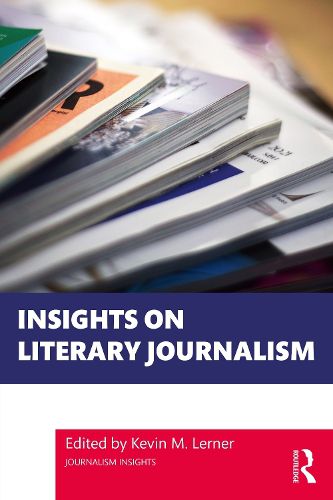Readings Newsletter
Become a Readings Member to make your shopping experience even easier.
Sign in or sign up for free!
You’re not far away from qualifying for FREE standard shipping within Australia
You’ve qualified for FREE standard shipping within Australia
The cart is loading…






Bringing together ten chapters by some of the most important scholars of literary journalism around the world, this book covers a range of topics that are key to understanding the role of literary journalism as both a practice and a topic of academic study.
Beginning with an introduction that situates literary journalism in its historical context, the chapters go on to address the basic definitional problem of literary journalism; the rhetorical strategies of literary journalists; the negotiated roles of subjects and storytellers; gender; geography; the role of literary journalism in fostering the public imagination; and the role of literary journalism in education. The chapters draw on contemporary and relatable case studies, which help readers link broader themes with their practical applications. This volume concludes with an Afterword by Bill Reynolds, editor of Literary Journalism Studies, which reflects on the preceding chapters and critically on the direction in which the field is heading in the near future.
Insights on Literary Journalism is highly recommended reading for advanced scholars and researchers of Literary Journalism as well as Literature and Media History.
$9.00 standard shipping within Australia
FREE standard shipping within Australia for orders over $100.00
Express & International shipping calculated at checkout
Bringing together ten chapters by some of the most important scholars of literary journalism around the world, this book covers a range of topics that are key to understanding the role of literary journalism as both a practice and a topic of academic study.
Beginning with an introduction that situates literary journalism in its historical context, the chapters go on to address the basic definitional problem of literary journalism; the rhetorical strategies of literary journalists; the negotiated roles of subjects and storytellers; gender; geography; the role of literary journalism in fostering the public imagination; and the role of literary journalism in education. The chapters draw on contemporary and relatable case studies, which help readers link broader themes with their practical applications. This volume concludes with an Afterword by Bill Reynolds, editor of Literary Journalism Studies, which reflects on the preceding chapters and critically on the direction in which the field is heading in the near future.
Insights on Literary Journalism is highly recommended reading for advanced scholars and researchers of Literary Journalism as well as Literature and Media History.